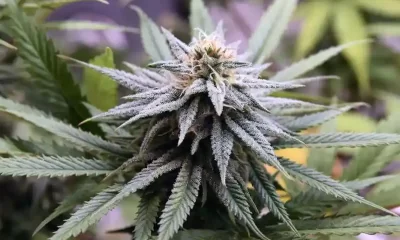Government
Senate Dems Ready To Introduce Cannabis Bill, Hearing Scheduled Next Week

Chuck Schumer, the Democratic leader in the Senate, had said that the marijuana reform bill would be introduced before the August recess.
With Congress set to break for its traditional August recess––and with this year’s midterm elections drawing nearer––Democrats in the Senate finally appear ready to introduce a bill that would end the federal prohibition on pot.
The Senate Subcommittee on Criminal Justice and Counterterrorism has scheduled a hearing for next week that is titled, “Decriminalizing Cannabis at the Federal Level: Necessary Steps to Address Past Harms.”
The chair of the subcommittee, Sen. Cory Booker (D-NJ), has taken a leading role in crafting the Senate’s cannabis reform legislation.
The hearing is scheduled for Tuesday.
Bloomberg had reported previously that Senate Democrats intended to introduce the bill this week.
Whenever the legislation drops, it will represent long-awaited action from a Democratic caucus that has moved methodically on cannabis reform––despite repeated pledges from party leaders that it will get done.
At the beginning of April, Democrats in the House of Representatives passed their own pot legalization package: the Marijuana Opportunity, Reinvestment, and Expungement (MORE) Act, which would deschedule cannabis from the Controlled Substances Act.
Senate Democrats said they would move forward with their own cannabis reform bill that has been overseen by Booker, Oregon Sen. Ron Wyden and Senate Majority Leader Chuck Schumer.
After previously saying that the Senate would release its own version by the end of April, Schumer said that the bill would likely be introduced closer to the Congressional recess in August.
And after recent suggestions that Senate Democrats might be looking to offer up a more modest reform package, it now appears that they will seek to match the House and end the federal prohibition as well.
Politico reported last month that Schumer “doesn’t have the votes to pass a sweeping marijuana decriminalization bill — despite repeatedly touting his support for ending federal prohibition,” and that “realization is leading Senate Democrats to look for a compromise on weed.”
But Bloomberg reported last week that Democrats will indeed introduce the bill that Booker, Wyden and Schumer have been working on: the Cannabis Administration and Opportunity Act, which will also remove pot from the Controlled Substances Act, although it would also give states discretion to establish their own cannabis laws.
Bloomberg noted that “the legislation faces long odds in the evenly divided chamber,” with 60 votes necessary for passage.
The bill faces significant opposition from Republicans in the chamber, and even some Democratic members.
President Joe Biden has long said that he is in favor of decriminalization of cannabis, but not outright legalization––though he has struggled to explain the distinction.
Earlier this week, Biden reiterated his belief that no one “should be in prison for the use of marijuana,” and said that he is working with Congress on a bill to fulfill his promise to release inmates serving time for pot-related offenses.
It is unclear whether he supports either the House’s MORE Act or the Senate’s Cannabis Administration and Opportunity Act.
Despite the slow-motion progress of the bill in the Senate, Schumer has been unequivocal in his support for sweeping cannabis reform.
“We will move forward,” Schumer told Politico last year. “[Biden] said he’s studying the issue, so [I] obviously want to give him a little time to study it. I want to make my arguments to him, as many other advocates will. But at some point we’re going to move forward, period.”
“In 2018, I was the first member of the Democratic leadership to come out in support of ending the federal prohibition. I’m sure you ask, ‘Well what changed?’ Well, my thinking evolved. When a few of the early states—Oregon and Colorado—wanted to legalize, all the opponents talked about the parade of horribles: Crime would go up. Drug use would go up. Everything bad would happen,” he added. “The legalization of states worked out remarkably well. They were a great success. The parade of horribles never came about, and people got more freedom. And people in those states seem very happy.”
Source: https://hightimes.com/news/senate-dems-ready-to-introduce-cannabis-bill-hearing-scheduled-next-week/
Business
New Mexico cannabis operator fined, loses license for alleged BioTrack fraud

New Mexico regulators fined a cannabis operator nearly $300,000 and revoked its license after the company allegedly created fake reports in the state’s traceability software.
The New Mexico Cannabis Control Division (CCD) accused marijuana manufacturer and retailer Golden Roots of 11 violations, according to Albuquerque Business First.
Golden Roots operates the The Cannabis Revolution Dispensary.
The majority of the violations are related to the Albuquerque company’s improper use of BioTrack, which has been New Mexico’s track-and-trace vendor since 2015.
The CCD alleges Golden Roots reported marijuana production only two months after it had received its vertically integrated license, according to Albuquerque Business First.
Because cannabis takes longer than two months to be cultivated, the CCD was suspicious of the report.
After inspecting the company’s premises, the CCD alleged Golden Roots reported cultivation, transportation and sales in BioTrack but wasn’t able to provide officers who inspected the site evidence that the operator was cultivating cannabis.
In April, the CCD revoked Golden Roots’ license and issued a $10,000 fine, according to the news outlet.
The company requested a hearing, which the regulator scheduled for Sept. 1.
At the hearing, the CCD testified that the company’s dried-cannabis weights in BioTrack were suspicious because they didn’t seem to accurately reflect how much weight marijuana loses as it dries.
Company employees also poorly accounted for why they were making adjustments in the system of up to 24 pounds of cannabis, making comments such as “bad” or “mistake” in the software, Albuquerque Business First reported.
Golden Roots was fined $298,972.05 – the amount regulators allege the company made selling products that weren’t properly accounted for in BioTrack.
The CCD has been cracking down on cannabis operators accused of selling products procured from out-of-state or not grown legally:
- Regulators alleged in August that Albuquerque dispensary Sawmill Sweet Leaf sold out-of-state products and didn’t have a license for extraction.
- Paradise Exotics Distro lost its license in July after regulators alleged the company sold products made in California.
Golden Roots was the first alleged rulebreaker in New Mexico to be asked to pay a large fine.
Source: https://mjbizdaily.com/new-mexico-cannabis-operator-fined-loses-license-for-alleged-biotrack-fraud/
Business
Marijuana companies suing US attorney general in federal prohibition challenge

Four marijuana companies, including a multistate operator, have filed a lawsuit against U.S. Attorney General Merrick Garland in which they allege the federal MJ prohibition under the Controlled Substances Act is no longer constitutional.
According to the complaint, filed Thursday in U.S. District Court in Massachusetts, retailer Canna Provisions, Treevit delivery service CEO Gyasi Sellers, cultivator Wiseacre Farm and MSO Verano Holdings Corp. are all harmed by “the federal government’s unconstitutional ban on cultivating, manufacturing, distributing, or possessing intrastate marijuana.”
Verano is headquartered in Chicago but has operations in Massachusetts; the other three operators are based in Massachusetts.
The lawsuit seeks a ruling that the “Controlled Substances Act is unconstitutional as applied to the intrastate cultivation, manufacture, possession, and distribution of marijuana pursuant to state law.”
The companies want the case to go before the U.S. Supreme Court.
They hired prominent law firm Boies Schiller Flexner to represent them.
The New York-based firm’s principal is David Boies, whose former clients include Microsoft, former presidential candidate Al Gore and Elizabeth Holmes’ disgraced startup Theranos.
Similar challenges to the federal Controlled Substances Act (CSA) have failed.
One such challenge led to a landmark Supreme Court decision in 2005.
In Gonzalez vs. Raich, the highest court in the United States ruled in a 6-3 decision that the commerce clause of the U.S. Constitution gave Congress the power to outlaw marijuana federally, even though state laws allow the cultivation and sale of cannabis.
In the 18 years since that ruling, 23 states and the District of Columbia have legalized adult-use marijuana and the federal government has allowed a multibillion-dollar cannabis industry to thrive.
Since both Congress and the U.S. Department of Justice, currently headed by Garland, have declined to intervene in state-licensed marijuana markets, the key facts that led to the Supreme Court’s 2005 ruling “no longer apply,” Boies said in a statement Thursday.
“The Supreme Court has since made clear that the federal government lacks the authority to regulate purely intrastate commerce,” Boies said.
“Moreover, the facts on which those precedents are based are no longer true.”
Verano President Darren Weiss said in a statement the company is “prepared to bring this case all the way to the Supreme Court in order to align federal law with how Congress has acted for years.”
While the Biden administration’s push to reschedule marijuana would help solve marijuana operators’ federal tax woes, neither rescheduling nor modest Congressional reforms such as the SAFER Banking Act “solve the fundamental issue,” Weiss added.
“The application of the CSA to lawful state-run cannabis business is an unconstitutional overreach on state sovereignty that has led to decades of harm, failed businesses, lost jobs, and unsafe working conditions.”
Business
Alabama to make another attempt Dec. 1 to award medical cannabis licenses

Alabama regulators are targeting Dec. 1 to award the first batch of medical cannabis business licenses after the agency’s first two attempts were scrapped because of scoring errors and litigation.
The first licenses will be awarded to individual cultivators, delivery providers, processors, dispensaries and state testing labs, according to the Alabama Medical Cannabis Commission (AMCC).
Then, on Dec. 12, the AMCC will award licenses for vertically integrated operations, a designation set primarily for multistate operators.
Licenses are expected to be handed out 28 days after they have been awarded, so MMJ production could begin in early January, according to the Alabama Daily News.
That means MMJ products could be available for patients around early March, an AMCC spokesperson told the media outlet.
Regulators initially awarded 21 business licenses in June, only to void them after applicants alleged inconsistencies with how the applications were scored.
Then, in August, the state awarded 24 different licenses – 19 went to June recipients – only to reverse themselves again and scratch those licenses after spurned applicants filed lawsuits.
A state judge dismissed a lawsuit filed by Chicago-based MSO Verano Holdings Corp., but another lawsuit is pending.
Source: https://mjbizdaily.com/alabama-plans-to-award-medical-cannabis-licenses-dec-1/
-

 Business2 years ago
Business2 years agoPot Odor Does Not Justify Probable Cause for Vehicle Searches, Minnesota Court Affirms
-

 Business2 years ago
Business2 years agoNew Mexico cannabis operator fined, loses license for alleged BioTrack fraud
-

 Business2 years ago
Business2 years agoAlabama to make another attempt Dec. 1 to award medical cannabis licenses
-

 Business2 years ago
Business2 years agoWashington State Pays Out $9.4 Million in Refunds Relating to Drug Convictions
-

 Business2 years ago
Business2 years agoMarijuana companies suing US attorney general in federal prohibition challenge
-

 Business2 years ago
Business2 years agoLegal Marijuana Handed A Nothing Burger From NY State
-

 Business2 years ago
Business2 years agoCan Cannabis Help Seasonal Depression
-

 Blogs2 years ago
Blogs2 years agoCannabis Art Is Flourishing On Etsy













